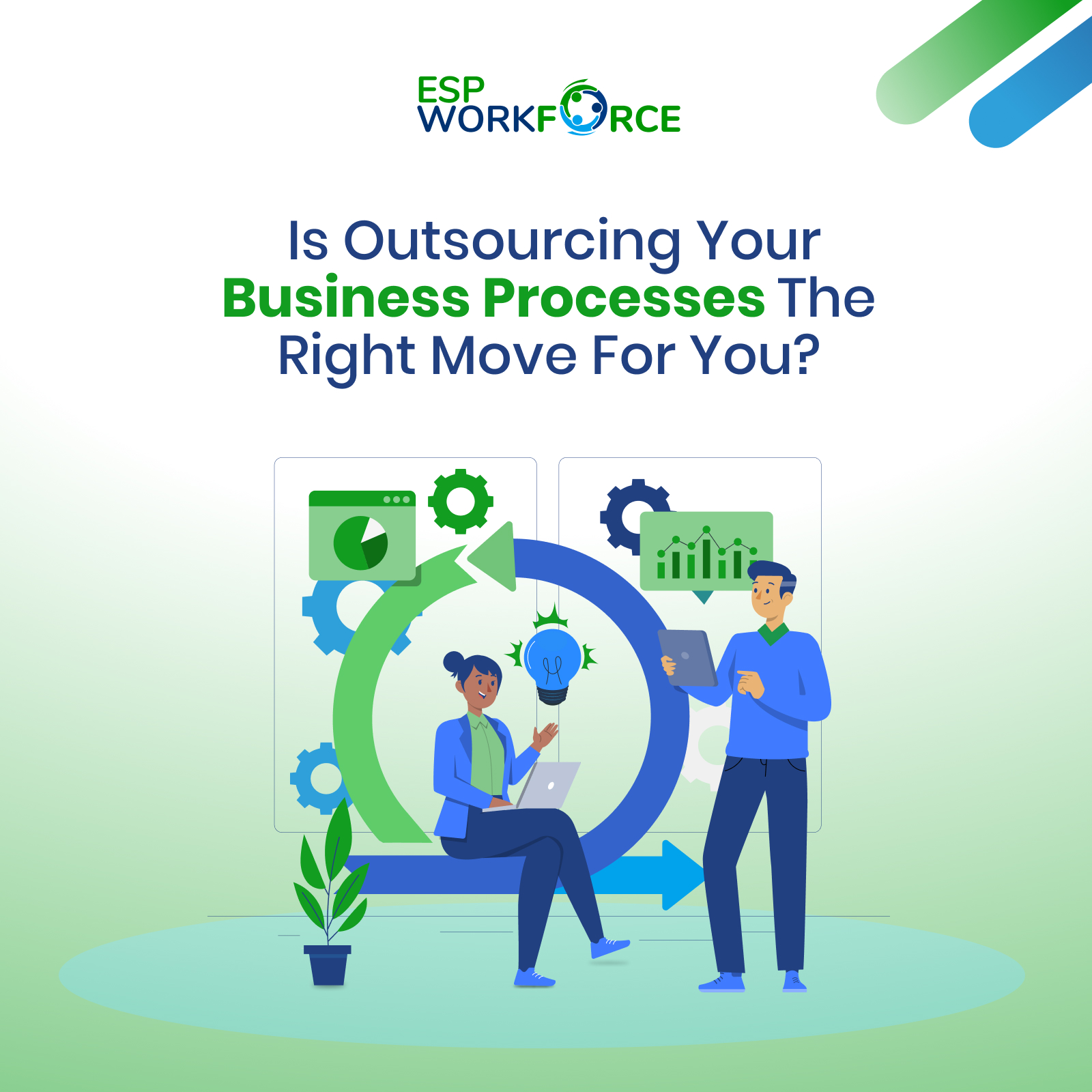No matter what industry you are in, staying ahead of the curve is crucial. It’s about thriving and making strategic moves that can transform your business.
One such move that has gained immense significance is outsourcing. It’s not just about pinching pennies; it’s about something much more powerful.
Do you know that about one-third of business owners waste countless hours on trivial things?
Picture having the capacity to optimize your resources, enhance the caliber of your output, and stay laser-focused on your ultimate business objectives. This blog serves as your gateway to understanding the capabilities of outsourcing.
We’ll walk you through its diverse dimensions, revealing that it’s more than a cost-saving tool. Instead, it emerges as a strategic move with the capacity to redefine your business’s trajectory.
What is Outsourcing and its Types
Outsourcing is a widely adopted business approach in which a company assigns particular responsibilities, functions, or processes to external service providers rather than managing them internally.

This deliberate strategy empowers businesses to prioritize their core strengths while leveraging the specialized expertise and resources available through external partners.
Here are some common types of outsourcing
Information Technology (IT) Outsourcing
IT outsourcing involves contracting IT-related functions to external service providers.
These responsibilities include activities such as software development, network administration, cybersecurity management, helpdesk support provision, and data center operation oversight.
IT outsourcing enables companies to stay at the forefront of technology while benefiting from specialized knowledge, all without breaking the bank.
Business Process Outsourcing (BPO)
Business Process Outsourcing (BPO) is the strategic delegation of a wide range of non-core business functions to external service providers.
These functions encompass pivotal aspects like customer support, call center operations, human resources (HR) management, finance and accounting functions, procurement processes, and back-office operations.
The primary goal of BPO experts is to streamline operations, control operational costs, and elevate the caliber of customer service.
Also Read: What Is BPO, and How Can It Benefit Your Business?
Manufacturing Outsourcing
Manufacturing outsourcing, often referred to as contract manufacturing, revolves around engaging external manufacturers to produce goods or components for a company.
This approach is notably utilized in industries like electronics, automotive, and pharmaceuticals. It comes into play when a company confronts limitations in terms of its internal manufacturing capabilities.
Content and Creative Outsourcing
In sectors such as marketing, advertising, and media production, outsourcing is a prevalent strategy for handling functions like content creation, graphic design, and creative tasks through specialized agencies or freelance professionals.
This choice is made to improve workflow efficiency and uphold the benchmark of high-quality work.
Knowledge Process Outsourcing (KPO)
KPO involves outsourcing knowledge-based tasks that require specialized expertise, research, and analysis.
This can include legal research, data analytics, market research, and healthcare-related services. KPO providers typically offer deep domain knowledge and advanced skills.
Offshore and Nearshore Outsourcing
Outsourcing services can be obtained from providers located in different geographic regions. Offshore outsourcing involves hiring providers in distant countries, often with significant cost savings but potential time zones and cultural differences.
Nearshore outsourcing involves contracting with providers in neighboring or nearby countries, offering a balance between cost savings and proximity.
Cloud Computing and Hosting Services
Many businesses outsource their hosting and cloud computing needs to specialized providers. Cloud computing services encompass Infrastructure as a Service (IaaS), Platform as a Service (PaaS), and Software as a Service (SaaS) solutions.
These service provisions empower companies to efficiently increase their IT infrastructure, eliminating the necessity of managing extensive in-house hardware resources.
Legal Process Outsourcing (LPO)
Legal firms and corporate legal departments may outsource legal research, document review, and other legal processes to external providers. LPO can help reduce legal costs and improve efficiency.
Logistics and Supply Chain Outsourcing
Companies frequently opt to delegate logistics and supply chain management responsibilities, which encompass activities like warehousing, transportation, and inventory management, to third-party logistics (3PL) providers.
This strategic decision is implemented to simplify operational workflows and control supply chain expenditures.
The provided examples are a limited representation of the numerous outsourcing avenues accessible to businesses.
The decision regarding the most fitting outsourcing method is influenced by the specific necessities, objectives, and particular responsibilities a company seeks to assign to external partners.
How to Determine If You Should Outsource Your Business Processes
The process of determining whether to outsource your business processes is a substantial decision, as it can significantly impact your company’s operational efficiency and financial resources.
To assess the appropriateness of outsourcing, ponder over the following key indicators:
Cost Evaluation
Look at your current expenses for handling a particular task or process in-house. Evaluate these costs against what it would probably require if you decided to contract a specialized provider for the task. When outsourcing delivers notable cost efficiencies, it’s a valid consideration.
Core Competencies Assessment
Keep your attention on what your company is best at its core capabilities. Pinpoint tasks that are not aligned with these strengths.
When a task does not match your core strengths, it becomes a potential outsourcing candidate. Outsourcing allows you to place your emphasis on what you do best.
Resource and Skill Gap Analysis
Analyze whether you have the necessary resources and skills in-house to execute a task efficiently. If you lack the expertise or the right people, outsourcing can fill that gap and ensure the task is handled competently.
Workload Fluctuations
Consider whether the demand for a particular task or process varies over time. If there are seasonal spikes or fluctuations, outsourcing can provide flexibility by scaling up or down as needed, saving you from overburdening your in-house team.
Time and Focus
Reflect on whether managing a specific task internally takes away valuable time and focus from your core business activities. If it distracts you from strategic goals, outsourcing can free up your time and attention for more critical matters.
Technology and Infrastructure
Assess whether you have the required technology and infrastructure to perform a task efficiently. If investing in such resources is costly or impractical, outsourcing to a provider with the necessary tools can be a smart choice.
Quality and Expertise
Consider whether an external provider can offer higher quality and expertise in performing a particular task. If experts can handle the task better than your in-house team, outsourcing can lead to better results.
Risk Mitigation
Evaluate the risks associated with a specific task, especially in areas like compliance or data security. Outsourcing to a provider with expertise in risk management can help mitigate potential issues.
Scalability
Think about whether your business plans involve growth or diversification. Outsourcing can provide scalable solutions that adapt to your changing needs.
Customer Service Enhancement
If customer support is a key concern, assess whether outsourcing can improve response times and customer satisfaction. With customer service outsourcing, you can expect continuous support.
These considerations provide the insights necessary to reach an informed verdict about whether outsourcing aligns with your business strategy. The ultimate goal is to optimize efficiency, curtail costs, and empower your company to center on its core capabilities.
Why Outsourcing Makes Sense for Your Business
Outsourcing can be a game-changer for your business, offering several compelling advantages that could be just what you need right now.
Accelerated Delivery and Enhanced Quality
Outsourcing can supercharge your business by delivering faster and higher-quality results. With the right outsourcing partner, you can improve your product and service offerings, reducing the lead time to bring your ideas to market. This means quicker innovation and a more competitive edge.
Focus on Core Competencies
By outsourcing routine tasks, you can redirect your in-house resources towards your core profit-generating activities.
For example, if your business is in skincare, you can concentrate on product development while outsourcing tasks like social media marketing or web development to boost your brand. This shift in focus enhances productivity without compromising quality or service.
Cost Efficiency
Outsourcing is often a cost-effective alternative to expanding internal operations.
It helps you sidestep expenses such as office space, recruitment, equipment, onboarding, healthcare, and payroll taxes associated with in-house employees. This translates to significant savings that can be reinvested elsewhere.
Facilitating Growth
Outsourcing is a growth enabler, especially when expanding internally is cost-prohibitive, time-consuming, or disrupts your business model’s efficiency.
It allows you to scale your operations without the complexities associated with hiring and managing an in-house workforce.
Improved Management
Outsourcing partners typically bring superior management skills to the table. They’re specialists in their fields and are driven to deliver results. This can enhance your overall business efficiency and effectiveness.
Staffing Flexibility
Outsourcing provides flexibility for operations or departments with fluctuating demands. You can bring in additional resources as needed, tapping into a global talent pool.
This adaptability ensures you always have the right resources at the right time.
Continuity and Risk Management
Outsourcing your human resource function ensures business continuity, even when key personnel are unavailable. It reduces the risk associated with sudden departures and buys you time to make well-considered hiring decisions.
Skill Development
Contractors can work alongside your internal staff, fostering skill development within your team.
On-site outsourcing allows your employees to learn from specialists while acquiring new skill sets. This collaborative approach can boost your team’s capabilities.
Outsourcing goes beyond mere cost-cutting; it serves as a strategic maneuver capable of propelling your business to greater heights.
It enables you to fine-tune your resource allocation, elevate quality standards, and maintain unwavering attention to your core business objectives.
Dispelling Myths About Outsourcing
Despite the numerous benefits of outsourcing, it’s not uncommon for misconceptions and unfounded stereotypes to deter businesses from exploring this avenue. Let’s debunk some of these myths:
Myth 1: Inefficiency Due to Cultural Differences
Effective communication is the linchpin of successful outsourcing relationships.
With clear and transparent communication channels, businesses can bridge cultural differences and foster synergy with their outsourced partners.
Leveraging modern technology and collaboration tools, you can ensure that cultural disparities do not hinder productivity or efficiency.
Myth 2: Low Performance and Productivity
Performance and productivity are not bound by geographical location.
High-performance standards can be maintained across borders by setting clear expectations, regular monitoring, and well-defined key performance indicators (KPIs).
Moreover, outsourced professionals are often motivated to excel, as their success is closely tied to the success of your business.
Myth 3: Developing Countries Can’t Match Western Standards
Many developing countries have made remarkable strides in education and technology, producing a skilled workforce that can rival that of Western nations.
With rigorous training and quality assurance measures, outsourcing partners in these regions can provide services of exceptional quality, often exceeding Western standards.
Outsourcing is a strategic tool that can empower your business to achieve greater efficiency, cost-effectiveness, and flexibility.
By dispelling common myths and embracing the collaborative potential of outsourcing relationships, you can harness the full spectrum of benefits it offers.
In today’s dynamic business environment, the decision to outsource may very well be the catalyst for your company’s success. If you need help free more hours and focus on what matters to you, ESP Workforce can help you.
Request a FREE consultation to discuss your business needs and hire a dedicated BPO.
